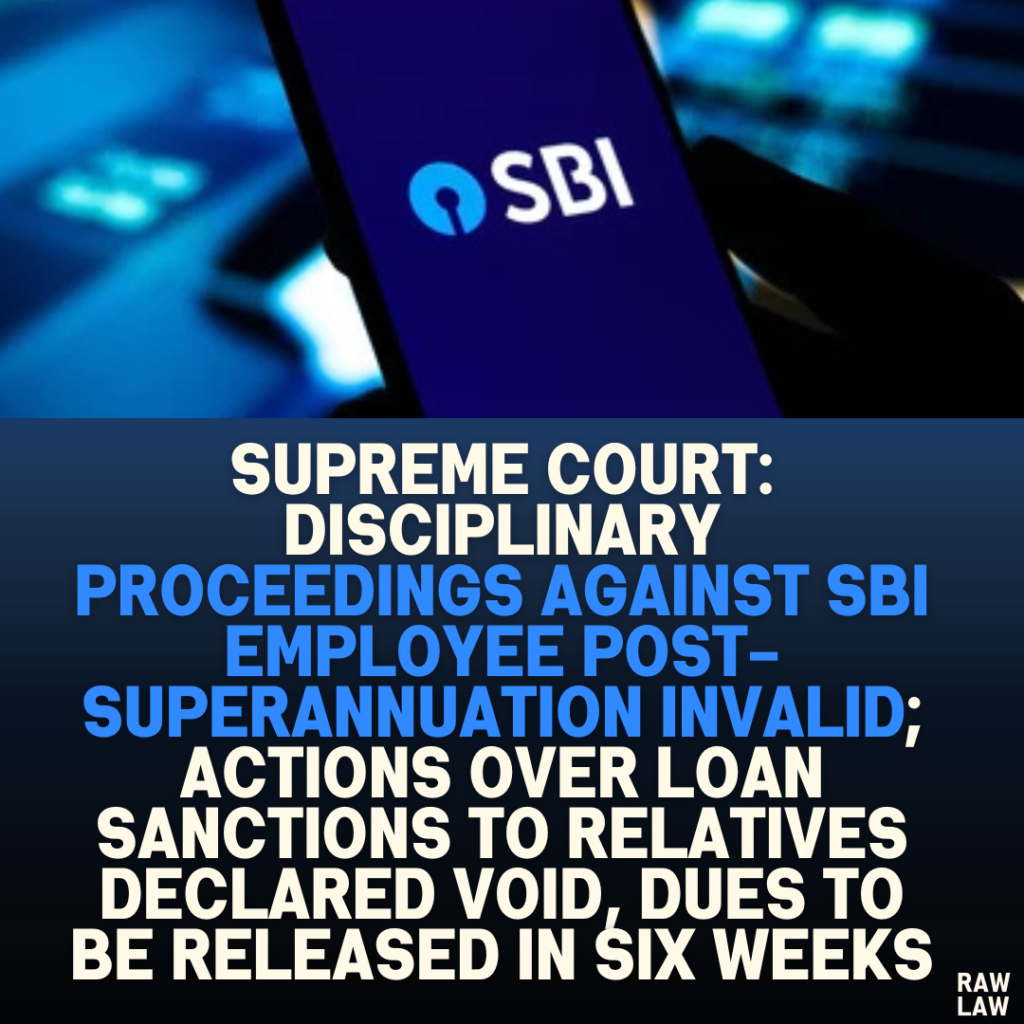Court’s Decision:
The Supreme Court dismissed the appeal by the State Bank of India (SBI), affirming the Jharkhand High Court’s decision that disciplinary proceedings initiated against an employee post-retirement are void. The Court directed SBI to release the respondent’s dues within six weeks.
Facts:
- The respondent joined SBI in 1973 and was promoted through the ranks.
- He was due to retire on December 26, 2003, but his service was extended until October 1, 2010.
- During his extended tenure, SBI issued a notice on August 18, 2009, alleging irregularities, including sanctioning loans to relatives without approval and unauthorized debits to customer accounts.
- Formal disciplinary proceedings began on March 18, 2011, after his extended service had ended.
- Following an inquiry that found 16 charges proved, SBI dismissed the respondent on March 7, 2012.
Issues:
- Can disciplinary proceedings be initiated after an employee’s superannuation or extended service period?
- What is the validity of actions taken under such proceedings?
Petitioner’s Arguments:
- The respondent remained subject to disciplinary action because his extended service lasted until October 1, 2010, and he accepted subsistence allowance beyond that date.
- The respondent had himself stated he would superannuate on October 30, 2012, creating ambiguity about his actual retirement date.
Respondent’s Arguments:
- The disciplinary proceedings initiated on March 18, 2011, were void as they commenced after his extended service ended on October 1, 2010.
- The High Court correctly relied on precedents to declare such proceedings legally unsustainable.
Analysis of the Law:
- Rule 19 of SBI Officers’ Service Rules, 1992:
- Disciplinary proceedings may only continue post-retirement if they are initiated during the employee’s tenure.
- Proceedings initiated after superannuation are void and lack jurisdiction.
- Legal Fiction:
- Rule 19(3) creates a legal fiction to deem an employee in service solely for concluding ongoing proceedings but does not permit initiation of new proceedings post-retirement.
Precedent Analysis:
The Supreme Court analyzed several key rulings to support its decision:
- Union of India v. K.V. Jankiraman (1991):
- Disciplinary proceedings commence only when a charge memo is issued, not when a show cause notice is served.
- UCO Bank v. Rajinder Lal Capoor (2007):
- Proceedings initiated post-retirement are without jurisdiction. Legal fiction applies only to cases where proceedings began before superannuation.
- Canara Bank v. D.R.P. Sundharam (2016):
- Legal fiction allows continuation of ongoing proceedings initiated during service, but no new proceedings can be started post-retirement.
These precedents firmly establish that proceedings initiated post-retirement lack legal standing.
Court’s Reasoning:
- The respondent’s extended service ended on October 1, 2010, severing the employer-employee relationship.
- The charge memo issued on March 18, 2011, was beyond the jurisdiction of SBI.
- Legal fiction under Rule 19(3) applies only to ongoing proceedings initiated during service and cannot validate proceedings commenced post-retirement.
Conclusion:
The Court upheld the High Court’s ruling, invalidating the disciplinary proceedings initiated after the respondent’s superannuation. It directed SBI to release all service dues within six weeks.
Implications:
This judgment reaffirms that disciplinary proceedings must be initiated within an employee’s tenure or valid extended service. It underscores the limits of legal fiction in employment law, protecting employees from unwarranted post-retirement actions.
